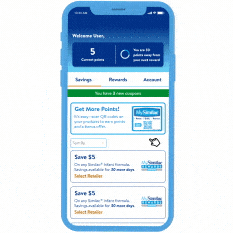Your baby’s world at 5 months: growing stronger every day
They’ll be using both hands for play and two-syllable sounds to communicate. By the end of month 5, your little one will probably have the strength to sit up with some support and pass toys from one hand to another.
At this age, your baby may start to display some wariness with strangers. Although they’ll have developed recognition of familiar faces, they might display mistrust and fear of new folks. This is normal and will pass in time.
Complete, balanced nutrition
Your 5-month-old needs proper nutrition to grow strong. Whether you choose to breastfeed or use baby formula, they’ll need protein, fat, carbohydrates, vitamins, and minerals to support the development of bones, muscles, immune system, brain, and eyes. Below are a few important components for growth and immune system development:
- Vitamin C helps form collagen, a protein that gives structure to bones, cartilage, muscles, blood vessels, and other connective tissue. In addition, vitamin C is essential for helping the body resist infection and supporting iron absorption.
- Calcium plays an important role in bone and tooth development, blood clotting, and maintenance of healthy nerves and muscles.
- Iron is necessary for proper growth and formation of healthy blood cells and is important for brain development. Iron is part of hemoglobin, a protein that is involved in carrying and storing oxygen.
- Proteins help develop, maintain, and repair new tissues throughout the body, including muscles.
Breastfeeding is the best way to help your baby grow. If you choose to formula feed, consider Similac® 360 Total Care®, as it is nutrition designed for immune support, brain development, and digestive health.
Showing off their muscles and brain power
Your baby’s muscles and brain cells are firing on all cylinders at this age. Here are 5 exercises to help your 5-month-old keep moving full speed ahead:
- Encourage your baby to raise their head and push up on their arms to watch what is happening in the world around them.
- Hold your baby upright under the arms. Slowly lower them until their feet touch the table, bed, or your lap to help them get a feel for standing in the future.
- Help your baby learn to sit up on their own. Start by propping them up in the corner of a couch or chair, which can prevent them from falling over. Just remember, never leave your baby unattended on a chair or couch.
- Try to get your baby to follow faces or bright objects with their eyes.
- Help your baby pick up small toys, such as 1-inch blocks. (Keep smaller objects that can cause choking out of your baby's reach and mouth.)
Sleeping patterns at 5 months
- Your baby might be sleeping 12 to 16 hours a day, including naps.1
- They might start to sit up and wake up in the process. If possible, let them try to get back to sleep on their own instead of immediately trying to provide comfort.







